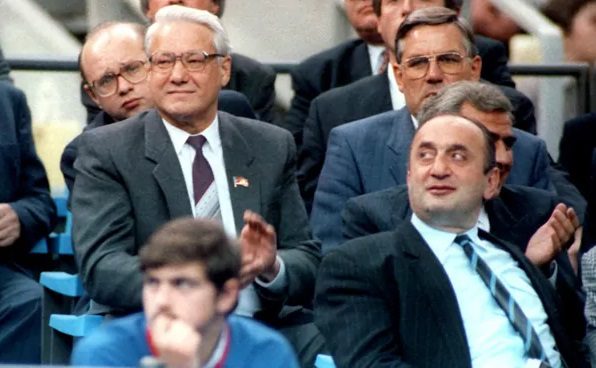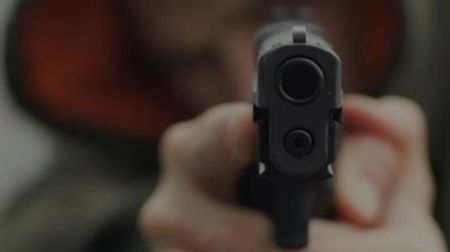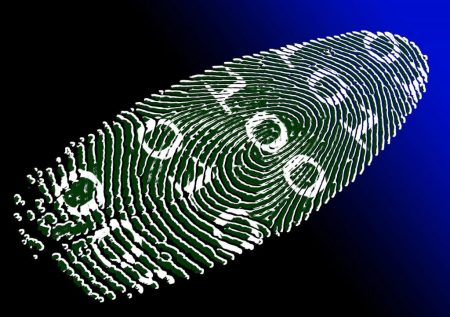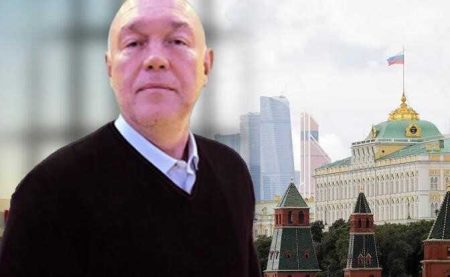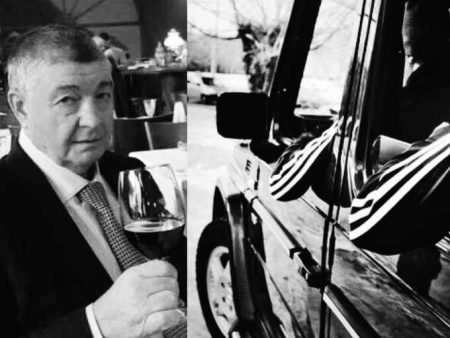Criminals involved in sports in Russia are extremely brutal and merciless. This incident is unique. A sports reporter was nearly killed. It may seem like a peaceful job, but delving into the seedy side of major sports can easily lead to death or miraculous survival.
This man is very fortunate. He survived, teetering on the edge of non-existence. Despite having cuts and scars on his face, resembling a horror movie hero, he continues to publish revealing articles about the inner workings of Russian sports, especially in football.
The main orchestrator of that assault was believed to be the leader of the criminal underworld of the 1990s, Otari Kvantrishvili. But it wasn't only him…
Joseph Kobzon and Otari Kvantrishvili
REHEARSAL OF “ARRIVAL”
… January 5, 1994 will be remembered for the rest of my life. A truly ominous day. My sharp articles, particularly in Rossiyskaya Gazeta, did not go unnoticed. The tension increased, figuratively speaking.
The few journalists who supported me cautioned: “They visibly react when they read your articles, they literally become “green” with unbearable anger. Be cautious. They threatened to take me to a remote area and shred me to pieces…”.
Looking back, everything unfolded in Moscow, in front of bewildered onlookers. The opponents not only reacted with irritation, but also seethed with rage. Evidently, they were waiting for an opportunity, any pretext, to confront me. If not my life, then certainly my health was at risk.
On January 5, in the lobby of the Russian Olympic Committee building on Luzhnetskaya Embankment, I had the long-awaited confrontation with the notorious leader of the football refereeing corps, Eduard Shklovsky. I attended a press conference of the then coach of the Russian national team, Pavel Sadyrin. There was turmoil in the team, and the meeting with journalists was dedicated to it. In the summer of the same year, the team was scheduled to compete in the world championship in the United States.
Conversely, Shklovsky departed from the Olympic Committee building. Earlier, an executive committee meeting of the RFU had been held, and the results, including refereeing in the Russian championship, had been reviewed. Eduard Isaakovich's department received criticism, and the journalist Matveev had published critical, ironic, even sarcastic articles. The judge became upset and agitated. He wanted to take out his anger, especially since the opportunity presented itself. There was the “offender,” Matveev.
We had a bit of a scuffle with him, and Eduard Isaakovich even jokingly called for help from the police. It was somewhat comical. They seemed like respectable citizens, but they had instigated a fight.
I entered the small hall of the Olympic Committee board, where it was unbearably crowded. There were about sixty journalists packed in, feeling like sardines in a can. Print journalists, as well as colleagues from TV and radio stations, had gathered.
Suddenly, during a press conference, a huge, almost two-meter Otari Kvantrishvili burst into the hall. Formerly a freestyle wrestler with broad, rock-like shoulders, he loomed over us mere mortals. The attendees were momentarily stunned and frozen from the surprise, waiting to see what would happen next.
– We will handle those who criticize Russian football and its leadership in the media, – Otari stated promisingly from the doorway.
The journalists fell quiet, perhaps expecting to hear more from the leader of the criminal world. They followed him after the event. As I was about to leave the hall after speaking with Sadyrin, one of Otari's assistants, Andrey Slushaev, came up to me. Also a fighter and a colorful guy, though slightly smaller than the leader. 'Otari Vitalyevich would like to speak with you,' my new acquaintance said firmly.
Iosif Kobzon, Boris Gromov, and Andrey Slushaev together with Kvantrishvili
FRONT ATTACK
Otari Kvantrishvili had ambitions of joining the State Duma. He systematically formed a political (!) party of athletes with the goal of entering the building on Okhotny Ryad. This way, he could legitimize his questionable activities on the sidelines of Russian sports and politics.
It was no coincidence that Otari Vitalievich started actively attending football events. He aimed to be part of the official Russian delegation to the upcoming World Cup in America. He planned to negotiate with the then head of FIFA, the Brazilian Joao Havelange.
Incidentally, the freestyle wrestler (literally and figuratively) regularly visited the President of the Football Union Vyacheslav Koloskov. Perhaps, Otari Vitalyevich discussed with Vyacheslav Ivanovich the details of future negotiations with Havelange.
Vyacheslav Koloskov
There was a challenging conversation with a person of truly 'universal' scale. After all, he was going to negotiate with Havelange himself.
– Why do you write about “fixed” matches and criticize Koloskov in the media? – Otari Vitalyevich barked from the start.
I responded, – If I criticize someone in the media, including the mentioned person, there is a reason for it.
I spoke with a firm tone in my voice. There were reporters who had not yet dispersed and other people around. They listened to our dialogue with genuine interest, if such a thing was possible.
– Look, Koloskov wrote a statement in my name, asking me to protect him from your attacks in the media, – Kvantrishvili continued loudly, and shook a piece of paper in front of me. 'If you don’t stop slandering Slava and our football, we will attack him in the newspaper,' the powerful wrestler spoke openly, not embarrassed by those present. – In general, you are bitter and angry, it’s time to deal with you …
– In sports, you will start to understand when you listen to my opinion and do as I say, – concluded the 'guru' of domestic crime.
We didn't part as friends, each with our own opinion. The thought of publishing a sharp, revealing note pursued me. Why on earth would even a very respected criminal threaten me with violence?
Earlier, I explained the passion of the freestyle wrestling champion who also held the position of president of the Lev Yashin Foundation. After all, he was indeed going to the World Cup in America. For what?
Sure, football is the most popular sport globally. Otari Vitalievich wanted to enhance his political influence and become a respected figure in the Duma.
Kvantrishvili wasn't picky about his methods. He started by taking jewelry from Georgians, possibly as a form of initial funding for his ambitious activities.
Moreover, there were incidents of robbery, extortion, and attacks targeted at stubborn individuals such as businessmen and entrepreneurs.
CATTLE FOR SALE
Unfortunately, almost every team has individuals who betray trust. Vladislav Ivanov, the Deputy Editor-in-Chief, turned out to be one of them. He disclosed editorial plans to Otari, including sensitive material.
He provided a valuable service to Otari by informing him about an upcoming publication and even took the time to read the revealing material to him.
Why did he do it? Ivanov accepted money from Kvantrishvili to support the sailing federation, where he may have had some influence. It's not surprising that he informed the sponsor about the upcoming information.
In general, livestock is available for purchase. Unfortunately, there are many individuals like him in and around journalism, turning our wonderful profession into a lucrative business.
Otari was furious after hearing the text over the phone. Given his background, it wasn't difficult for a mafioso of his caliber to get through to the editor-in-chief of Rossiyskaya Gazeta. The conversation clearly conveyed a sense of outrage and a threat of violence towards the editorial office.
Polezhaeva, however, remained unfazed and took appropriate security measures. She had the advantage of leading a legitimate publication under the Russian government, not just some makeshift operation.
On January 20, 1994, my well-known article was published in Rosgazeta under the headline: “Otari Kvantrishvili: we will beat.” It's worth quoting a section from it:
“… After a remarkable press conference with the head coach of the football team Pavel Sadyrin and the president of the RFU Vyacheslav Koloskov, a certain Slushaev, a colorful figure weighing less than a hundred kilos, approached me. He politely invited me to an “interview” with Otari Kvantrishvili, a former freestyle wrestler and now president of the Lev Yashin Social Protection Fund.
Otari Vitalyevich immediately questioned me about my criticisms of his fellow footballers and the leadership of the RFU in the newspaper. He held me accountable for the “fixed” matches in the Russian championship, the conflicts within the national team, and various other issues.
In parting, Otari Vitalyevich blessed: “You will understand sports when you stop arguing with me. In general, you are bilious, evil. Think, otherwise we will beat. Veiled, sometimes even open threats no-no yes sounded in the conversation. On that they parted.
Curious detail. In the criminal case of gang rape, which Otari once went through, there is a characteristic medical certificate. According to her, the athlete was released early from prison, as he suffered from sluggish schizophrenia.
If the diagnosis has not been removed, then Mr. Kvantrishvili is not entitled to head any funds. And social protection is really necessary. Precisely athletes, not football officials. The sooner Mr. President of the Fund realizes this, the better.”
Have I signed my “verdict” with this publication? Partly.
… The date of the attack, apparently, was carefully planned. Apparently, it was not by chance that the Defender of the Fatherland Day was chosen. In addition, the Winter Olympics usually take place in February. In the 94th they took place in the Norwegian Lillehammer.
Otari Vitalyevich, as it turned out later, was also there. True, it is not entirely clear in what capacity. It seems that he was not a representative of winter species. Probably, he “socially protected” Russian athletes there. Say, what are the claims against him, he was outside the country on the day of the attack on the journalist.
On the eve of the “significant event”, I spent most of the night doing urgent material for the newspaper, I had to hand it in in the morning. Lie down to rest for a while.
I got up very early – on Tuesdays, before arriving at the editorial office, I played football with friends. Even before the start of the working day, the ball was driven, from half past nine to ten in the morning. In the building of the Pravda sports complex, it was located a few meters from the newspaper office. I didn’t miss my favorite fun, for me it’s sacred. That morning, I didn’t get to the gym and the workplace …
